World War 2 Causes

World War 2 Causes the largest armed conflict that humanity has known, a deadly war that involved tens of millions of fighters around the world. At the end of world war 1, Germany and its allies Austria-Hungary, Bulgaria, Ottoman empires that were defeated and held solely responsible for the war. With heavy penalty imposed them, the Austro-Hungarian and Ottoman empires are break up, while Germany has to repay what many consider an unreasonable debt that the main World War 2 Causes.
The first annexed Austria with help from the local Nazi party. Next, the west of Czechoslovakia was attacked. The Slovak becomes a German dependent state while Hungary grows closer diplomatically. After the occupation of a part of Lithuania. Germany signs with the Soviet Union a non-aggression pact and a plan to carve up Europe. It then assaults Poland, which provokes the France and UK to declare war, marking the beginning of world war II. Although the German forces are focused in the east, the Allied army do not take initiative in the West. Instead, the UK and France try to cut the strategic iron ore route that go through Norway and supplies the German military. Germany reacts by invading Norway and Denmark. Within few days, the country captures Luxembourg, the Belgium and Netherlands. Hitler’s new military plan is called blitzkrieg, which surprises opposition defenses with rapid, high-intensity attacks in a concentrated territory. British forces pull back in the face of this German military Powers, and the German army bears down the Paris. The French army is defeated and the armistice is signed.
Germany occupies the France north and west areas, leaving its other colonies and territory under the control of the new government. Germany thus has indirect control of French colonies without having to send an army there.
However, parts of the French colonies and the Belgian Congo chose to stay in the camp of Allies. In London, which already hosts several governments in exile, general Charles de Gaulle creates free France which continues to fight Nazi Germany. Brazzaville is named as its capital.
An agreement is signed with Germany; the Soviet Union seizes a part of Romania. Germany and the Baltic states, Japan and Italy combine to form the Axis powers. All dominions and British territory, with the exception of Ireland, enter the war. In Africa, fighting begins between Allied forces and Italian colonies. While in Europe, despite the massive aerial bombing of British cities, Germany fails to take over the country. Hitler then changes his plans; he now wants to attack the USSR. but the plan is delayed by Italy, that fails to attack Greece and is forced to retreat by Allied forces. After the accession of Hungary, Romania and Bulgaria to the Axis forces, the German armies head south to attack Yugoslavia and Greece. Everywhere in Europe, the resistance is organized in different forms. Sometimes, people do strikes, demonstrations or protect wanted persons. Groups of spy for the Allies, conduct print or sabotage resistance newspapers. In eastern Europe, guerilla forces weaken the Axis armies.
World War 2 Causes On June 22, Axis army launched-on some counts- the heavy military operation in history to attack USSR, which now passes de facto into the camp of Allied forces. The bulk of the German army, well equipped. To support the Soviets, Allies forces occupy Iran which then opens a supply route through the Caucasus. German forces arrive in Leningrad and begin a siege of the city that would last 872 days that cause more than 1 million civilian deaths.
Further south, German army were stopped at the gates of Moscow, where they suffered a deadly and harsh winter.
To counter its expansionist policy, the USA imposes upon it an embargo on oil and steel. In react the Japanese conducted a surprise attack on the USA at pearl harbor. A heavy aerial bombing damages a large part of the United States naval fleet. The USA enters the war on the allied side.
Hitler built the Atlantic wall, a series of army installations protecting the coast from invasion. But the Allies first landed in Algeria and Morocco. Italian Libya found itself caught between two fronts. Having lost control of its territories, France was attacked. Africa is now completely controlled by Allies forces who organize a landing in Sicily.
The USSR advances quickly westward, forcing the German to concentrate on that front. On June 06,1994, the Allies landed in France Normandy. Their Armies quickly take over and liberate Paris. In the East, as in the West, countries are liberated or switched camps. With victory in sight, allied powers countries announce the creation of the united nations. Countries that declared war on Japan and Germany would be admitted at its founding conference. This triggers a wave of war but without major consequence.
Hitler On April 30 commits suicide in his bunker just before the arrival of the soviets. Eight days later, the Germany surrenders. The USSR and USA join forces to overcome the Japan empire. The soviets begin a military invasion via Manchuria while the US drops two atomic bombs on Hiroshima and Nagasaki. 15 august Japan surrendered, As a end of world war II.
Conclusion: With 6 years of war, the world toll is heavy with at least 60 million dead, mostly civilians. Many cities are entirely destroyed. Europe and USSR subject millions of German prisoners of war to bonded labor, many of whom would die. Austria and Germany are carved up among the victors.
Articles List
-

-

-

-

-

-
 Pizza Hut Lahore Deals that Started by Two brothersPizza Hut was started in June 1958 by 2 Wichita government University students, brethren Dan and Frank Carney, as one first position at Wichita, KS. Six months after they opened 2nd within the year they had six Pizza Hut restaurants. These brothers started franchising in 1959. The picture Pizza Hut business style was planned in 1963. PepsiCo developed Pizza Hut in Nov 1977.
Pizza Hut Lahore Deals that Started by Two brothersPizza Hut was started in June 1958 by 2 Wichita government University students, brethren Dan and Frank Carney, as one first position at Wichita, KS. Six months after they opened 2nd within the year they had six Pizza Hut restaurants. These brothers started franchising in 1959. The picture Pizza Hut business style was planned in 1963. PepsiCo developed Pizza Hut in Nov 1977. -

-
 Coronavirus Precautions and TreatmentsCoronaviruses are a large group of viruses that are common among animals. They are also called zoonotic as sometimes they can be transferred from animals to humans. Coronavirus has a tendency to spread much like cold viruses. It impacts your nose, Sinuses, or upper throat causing problems to breathe.
Coronavirus Precautions and TreatmentsCoronaviruses are a large group of viruses that are common among animals. They are also called zoonotic as sometimes they can be transferred from animals to humans. Coronavirus has a tendency to spread much like cold viruses. It impacts your nose, Sinuses, or upper throat causing problems to breathe. -

-
 World War 1 Started causes and historyWorld war 1 is also known as the end of all wars, the Great War. The Great War Started from 28th July 1914 to 11th November 1918. 135 Countries took part in world War 1 and more than 15 million died in this War. World War 1 was caused by a complex alliance system. (A union or association formed for benefits).
World War 1 Started causes and historyWorld war 1 is also known as the end of all wars, the Great War. The Great War Started from 28th July 1914 to 11th November 1918. 135 Countries took part in world War 1 and more than 15 million died in this War. World War 1 was caused by a complex alliance system. (A union or association formed for benefits).